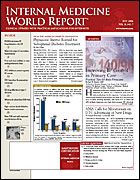Publication
Article
Internal Medicine World Report
Aliskiren First Oral Renin Inhibitor in New Antihypertensive Class
Author(s):
Effective as Monotherapy and with Diuretic Combo
NEW YORK CITY—Renin inhibitors offer a new mechanism for blocking chronic activation of the renin-angiotensin system (RAS) while reducing blood pressure (BP), said investigators at the 21st annual meeting of the American Society of Hypertension.
The investigational drug aliskiren (Novartis) is the first orally active renin inhibitor, representing the first new class of antihypertensive agents in more than a decade, said Jerry R. Mitchell, MD, PhD, chairman and chief executive officer of the Texas Center for Drug Development, and Baylor College of Medicine, Houston.
Renin is the rate-limiting step in the renin-angiotensin cascade. Aliskiren, therefore, blocks the RAS at its point of activation (ie, formation of renin) to reduce BP, whereas angiotensin-converting-enzyme (ACE) inhibitors and angiotensin receptor blockers block the RAS further downstream. Although renin levels are not suppressed with aliskiren, renin activity is markedly reduced.
High levels of renin activity are associated with an increased risk of cardiovascular (CV) events, especially myocardial infarction, and the hope is that blocking renin activity will prevent events and protect target organs.
Phase 3 trial data show that aliskiren is an effective antihypertensive agent both as monotherapy and in combination with the diuretic hydrochloro-thiazide (Hydro-Par).
Dr Mitchell presented data from 216 patients with mild-to-moderate hypertension who had 24-hour ambulatory BP monitoring over 8 weeks. As part of a larger study, they had been random-ized to placebo or to 1 of 3 doses of aliskiren—150, 300, or 600 mg/day.
P
P
“All 3 treatment dosages were highly statistically effective at lowering blood pressure,” he said. Reductions in mean ambulatory systolic BP surpassed placebo in the 3 groups, by 11.4 mm Hg (150 mg), 10.5 mm Hg (300 mg), and 11.7 mm Hg (600 mg), respectively (all <.001). Reductions in 24-hour ambulatory diastolic BP were also significantly better with all doses of aliskiren compared with placebo ( <.001).
“There was no morning surge in blood pressure [with aliskiren],” said Dr Mitchell. “The drug works throughout the 24-hour cycle.” Variability in BP and early morning surges correlate with increased risk of CV events, he noted.
In a second trial presented at the meeting, the combination of aliskiren and hydrochlorothiazide achieved greater reductions in sitting BP than either agent alone. This single-blinded study included 2776 patients who were randomized to placebo, aliskiren (75, 150, or 300 mg), hydrochlorothiazide (6.25, 12.5, or 25 mg), or combinations of the 2 drugs, for a total of 8 weeks.
Aliskiren produced a dose-dependent reduction in BP levels, said lead investigator Alberto Vilamil, MD, of the Fundapres, Las-Heras, Buenos Aires, Argentina.
P
Patients taking the combination of aliskiren 300 mg/hydrochlorothiazide 25 mg had a mean reduction of 21.2/14.3 mm Hg in sitting BP ( <.001 vs placebo).
The response with the aliskiren/ diuretic combination therapy was better than with either agent alone. The responder rate, defined as a final achieved sitting diastolic BP <90 mm Hg or at least a 10-mm Hg reduction in sitting diastolic BP, ranged from 55% to 81% with all drug combinations, 64% with aliskiren 300 mg, and 46% with placebo.
The incidence of adverse events was similar in the treatment and placebo groups, with headache and nasopharyngitis most often reported by all patients, said Dr Vilamil.
In the aliskiren groups, 0% to 4.4% of patients stopped taking their assigned therapy compared with 3.6% in the placebo group.






